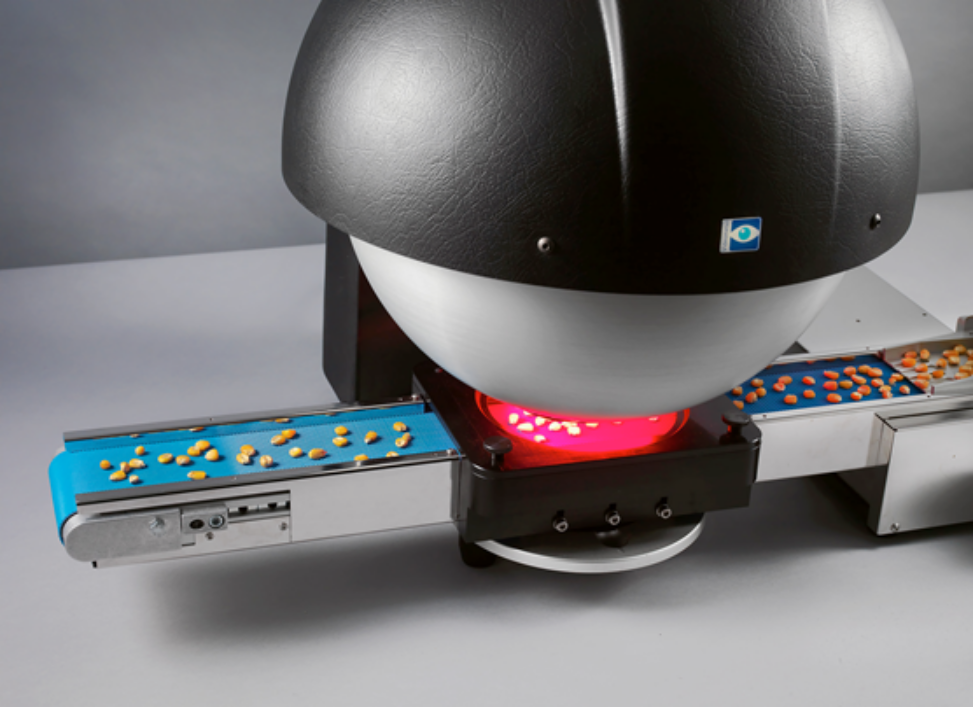品质至上,客户至上,您的满意就是我们的目标
技术文章
当前位置: 首页 > 技术文章
种子表型组学:基于多光谱成像技术快速无损检测紫花苜蓿人工老化种子
发表时间:2022-09-26 08:27:56点击:962
来源:北京博普特科技有限公司
分享:
Videometer Lab4多光谱种子表型成像系统是丹麦理工大学与丹麦Videometer公司开发,是用于种子研究先进的多光谱表型成像设备,典型客户为ISTA国际种子检验协会、ESTA欧洲种子检验协会、John Innes Centre、LGC化学家集团、奥胡斯大学等等,利用该系统发表的文章已经超过300篇。
Videometer种子表型表型成像系统可测量种子如尺寸、颜色、形状等,间接测定种子参数如种子纯度、发芽百分比、发芽率、种子健康度、种子成熟度、中寿命等。种子活力综合种子活力是种子发芽和出苗率、幼苗生长的潜势、植株抗逆能力和生产潜力的总和(发芽和出苗期间的活性水平与行为),是种子品质的重要指标,具体包括吸涨后旺盛的代谢强度、出苗能力、抗逆性、发芽速度及同步性、幼苗发育与产量潜力。种子活力是植物的重要表型特征,传统检测方法包括低温测试、高温加速衰老测试、幼苗生长测定等。
该系统也可以对细菌、虫卵、真菌等进行高通量成像测量,进行病理学、毒理学或其它研究。对于拟南芥等冠层平展的植物,可以进行自动的叶片计数等。

VideometerLab多光谱种子表型成像系统
基于多光谱成像技术快速无损检测紫花苜蓿人工老化种子
摘要
种子老化是影响种子生产和储藏的重要因素,给农业生产带来了严重的经济损失,已成为影响种子活力中最具威胁性的因素之一。老化种子的检测以及种子老化后发芽情况的鉴定对种子生产具有重要意义,但目前常用的检测手段都是一次性、破坏性的。因此,一种快速、无损的种子老化和发芽检测方法不仅是研究的需要,也是种子行业进行种子检测分选所急需的。利用多光谱成像技术,采集紫花苜蓿种子的形态和光谱特征数据,利用LDA(线性判别分析)、SVM(支持向量机)和nCDA(归一化标准判别分析)3种多元分析方法,对不同老化程度苜蓿种子及其发芽情况分别进行分类和预测。结果表明,不同老化程度种子平均光谱反射率在470~660 nm处出现了明显的区别。LDA可以区分老化种子和未老化种子(准确度93.0%~97.7%),也可以区分不同老化程度的种子(准确度75.3%~91.7%),且均高于SVM的分类结果(准确度分别为92.4%~94.9%和68.7%~78.8%);nCDA对老化种子进行区分的准确度高达88%~98%。同时,LDA可以准确预测发芽种子和不发芽种子,准确度可达98.7%,高于SVM的92.1%;nCDA预测老化种子发芽准确度达到了90%~99%。本研究证明了多光谱成像与分析技术不仅可以区分老化种子,也可以预测种子的发芽。上述结果证实多光谱成像技术结合多元分析为高效无损检测苜蓿种子活力提供了新途径,具有良好的应用前景。

图1 4组种子材料的多光谱RGB成像
关键词:老化种子;多光谱成像;多元分析;紫花苜蓿;无损检测
Abstract
Aging during the storage of seeds reduces seed vitality and causes serious economic losses to the agricultural industry, and has become one of the biggest factors involved in decreased seed vigor. Distinction between aged and viable seeds is of high importance in alfalfa seed planting and production, but the existing methods are time-consuming or destructive. Therefore, a rapid and non-destructive screening method to distinguish aged and viable seeds is not only very necessary in seed testing and the alfalfa seed industry, but also potentially useful in alfalfa seed research. In this study, we collected data of both morphological features and spectral traits of alfalfa seeds using multispectral imaging (MSI) technology. Then, we evaluated three multivariate analysis methods: linear discriminant analysis (LDA), support vector machines (SVM) and normalized canonical discriminant analysis (nCDA), to classify seeds artificially aged for 0, 3, 6 and 14 days, and predict viable seeds which could germinate. It was found that the mean light reflectance at 470-660 nm differed significantly between non-aged and aged seeds. The LDA model based on a “hold-out method” provided accuracies of 93.0%-97.7% in distinguishing aged seeds from non aged seeds, and 75.3%-91.7% in distinguishing the different groups of aged seeds. Corresponding values for the SVM model were a little lower, being 92.4%-94.9% and 68.7%-78.8%, respectively. The nCDA model also exhibited achieved aged seed discrimination with an accuracy of 88.0%-98.0%. Finally, viable seeds could be distinguished from dead seeds in all the categories of aged seeds, with accuracies of 98.7% and 92.1% in LDA and SVM analysis, respectively, while the accuracy of nCDA in predicting the germination of aged seeds ranged from 90% to 99%. This study showed that MSI could successfully distinguish aged seeds, and also predict germination of seeds. In summary, we demonstrated a nondestructive, rapid and high-throughput approach to screen both aged and viable seeds in alfalfa, and showed that MSI together with multivariate analysis is promising as a new tool for application in seed testing and field planting of alfalfa seeds.
相关阅读
Videometer种子表型组学:多光谱成像作为菠菜种子健康检测的潜在工具
Videometer种子表型组学:多光谱图像分析在种子种质库管理中的应用
Videometer种子表型组学:利用可见光、近红外多光谱和化学计量学对不同番茄种子品种的分类
Videometer种子表型组学:使用多光谱成像和化学计量学方法在线鉴别水稻种子
Videometer种子表型组学:使用多光谱成像预测蓖麻种子的活力
Videometer种子表型组学:甜菜种子加工损伤的多光谱图像分类
种子表型组学:利用多光谱成像和化学计量学方法对大豆种子进行无损鉴别
种子表型组学:Videometer多光谱成像种子质量评估的新工具
种子表型组学:基于可见-近红外多光谱图像数据的偏最小二乘判别分析检测菠菜种子的发芽能力和胚芽长度
种子表型组学:使用灰度共生矩阵和机器学习技术识别单倍体玉米种子
种子表型组学:通过射线照相和多光谱图像分析测定小麦种子中的侵染
种子表型组学:盐胁迫下九个高羊茅品种的种子萌发和幼苗生长参数
种子表型组学:基于多光谱和共振成像技术的麻疯树种子健康分析新方法
种子表型组学:多光谱成像结合多变量分析的单株紫花苜蓿种子品种鉴别
种子表型组学:通过多光谱成像分析对自然老化的紫花苜蓿种子进行无损鉴定
种子表型组学:自动荧光光谱成像作为一种快速、无损和可靠地评估大豆种子质量的创新方法
种子表型组学:一种利用新兴光学技术和人工智能的方法作为新标记评估花生种子质量